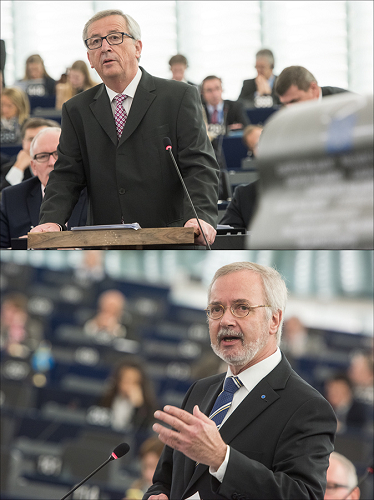Investing €315 billion to jump-start the EU economy
European Commission President Jean-Claude Juncker announced the creation of a new EU strategic investment fund designed to mobilise at least €315 billion over the next three years to jump-start the EU economy. After his presentation in Parliament’s plenary session on Wednesday, MEPs from most political groups voiced support, but also demanded swift action to boost growth in the EU.

Commission President Jean-Claude Juncker and European Investment Bank President Werner Hoyer unveiled the €315 bn investment plan in a plenary debate with political group leaders
Mr Juncker said the plan is based on three pillars:
- creating a new European Fund for Strategic Investments in June 2015, backed by €21 billion from the EU budget and the European Investment Bank (EIB), to mobilise at least €315 billion in additional investment in 2015 – 2017,
- establishing a “project pipeline”, coupled with an assistance programme, to channel investments to where they are most needed, and
- a roadmap to make Europe more attractive for investment and remove regulatory bottlenecks.
Political group speakers
Praising the Juncker investment plan, EPP group chair Manfred Weber (DE), said "Mobilising private capital is better than making new debts", nonetheless stressing that member states should continue structural reforms, because "if legal proceedings last as long as they do in Italy, if the labour markets are too rigid as in France and if planning procedures last months and years as they do in my country, then it is hardly surprising that there are no investments".
S&D group leader Gianni Pittella (IT), said "We would have liked more public money, more investment, but this is a good starting point". He stressed that his group is not interested in "what the credit agencies are saying - we are interested in peoples' lives". He also reminded Mr Juncker that the S&D supported him on condition that he delivered the investment package and that Parliament should be fully involved.
Taking up Mr Juncker’s “watering can” analogy for the package, ECR group leader Syed Kamall (UK) asked "How do we make sure it is a watering can that stimulates growth? How do we make sure that it is not a government flood that washes away private investment? How do we make sure that it is not a private irrigation system that is never turned on? What we need are detailed answers to some of our questions (...) Maybe then we can support your project".
ALDE group leader Guy Verhofstadt (BE), stressed that investment must be supported by structural reform in member states. "Maybe labour market reform should be a conditionality to get the funds", he suggested, also highlighting the need to complete the EU’s digital, energy and capital single markets. "Otherwise, money would be lost on a big scale", he said. Mr Verhofstadt also suggested exempting use of the funds from tax, in order to attract more private investment.
For the GUE/NGL group, Dimitrios Papadimoulis (EL), told Mr Juncker that "the package you presented is just empty words. €16bn comes from the EU budget and €5bn from the EIB. There is not one Euro of fresh money in there, and you promised that you are going to create some kind of leverage effect multiplying funds by 15. In these times of stagnation and recession in the Eurozone, there is no economist in the world that would believe this".
Speaking for the Greens/EFA group, Philippe Lamberts (BE), called the investment package "very well intended", but stressed the need to "put an end to the casino economy". He argued that "fighting fraud and tax evasion" should be an "integral part" of the plan and stressed the need to switch to greener energy sources within the EU. "We shouldn't be giving €1 billion a day to Vladimir Putin and his energy system", he said.
Patrick O'Flynn (UK), said on behalf of EFDD that Mr Juncker was "throwing good money after bad" while the main problem is the Euro as a single currency which prevents southern EU states from allowing national currencies to depreciate and thus create more favourable conditions for investment.
Non-attached member Gerolf Annemans (BE) said that the investment package is "basically a recycling, a relabelling (...) This is a useless watering can, hocuspocus, abracadabra, and this is just monopoly money".
Commission response
Speaking for the Commission, Vice-President Jyrki Katainen said that the new fund would maximise impact on real economy, unlock public and private investments in real projects and create real jobs. He also emphasized that the member states' contributions to the fund will be neutral with respect to the Stability and Growth Pact. The fund should also embody a "new approach at European level – to change the way public money is used", especially by supporting riskier borrowing.
Source: European Parliament
- 261 reads
Human Rights
Fostering a More Humane World: The 28th Eurasian Economic Summi

Conscience, Hope, and Action: Keys to Global Peace and Sustainability

Ringing FOWPAL’s Peace Bell for the World:Nobel Peace Prize Laureates’ Visions and Actions

Protecting the World’s Cultural Diversity for a Sustainable Future

Puppet Show I International Friendship Day 2020

